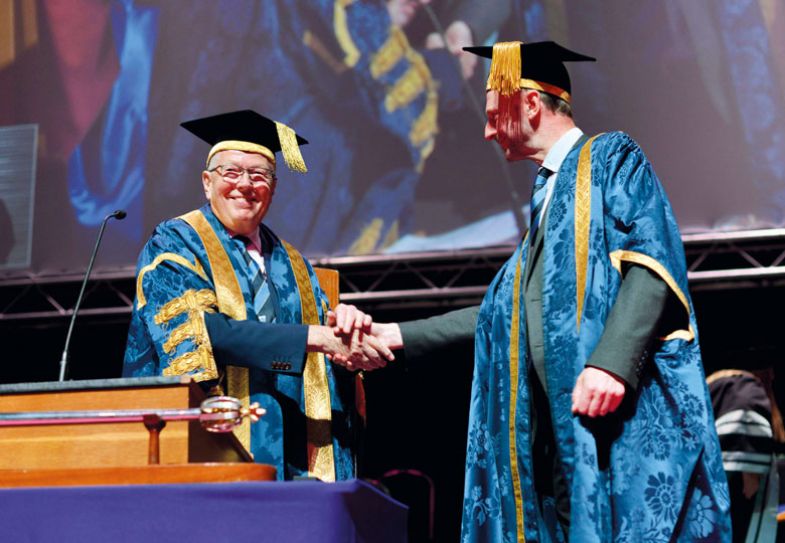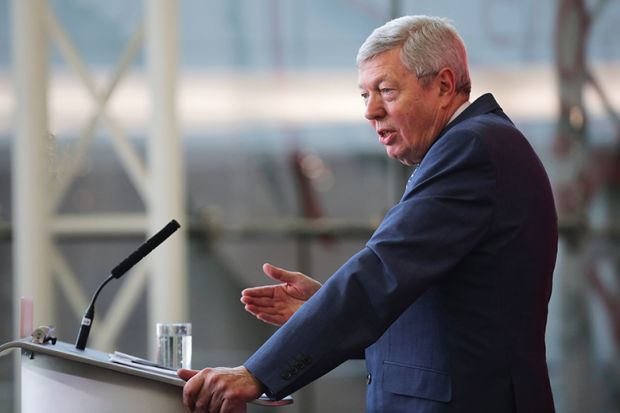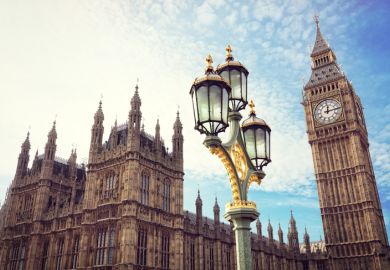“Probably it was my lack of qualifications that qualified me to be universities minister,” says Alan Johnson.
In June 2003, the then Labour MP for Hull West and Hessle was in a car driving across the Humber Bridge when he took a call from prime minister Tony Blair offering him the job of minister for lifelong learning, further and higher education.
“You do understand I never went to university,” Johnson told Blair. “Precisely,” he remembers Blair replying.
This was in the run-up to the bloody political battle around the Labour government’s introduction at English universities of tuition fees of up to £3,000, trebling the fee introduced earlier in Labour’s time in government. “Of course, what Tony wanted was someone there [as minister] who couldn’t be accused of pulling up the ladder after them,” says Johnson.
As he recalls it, when he was interviewed by Jeremy Paxman, the most aggressive political broadcaster of the era, ahead of the crucial vote in the House of Commons, Paxman’s opening foray was that Johnson benefited from a university degree with no fees and generous grants, so why was he introducing fees?
Paxman’s “whole interview was based on that”, Johnson tells Times Higher Education (in the absence of any footage, we’ll have to take his word for it). “As soon as I pointed out to him I’d left school at 15 it fell apart. He didn’t have anything.”

Were Johnson’s life to be the plot of a novel or film, it would go beyond uplifting into cheesy implausibility. A working-class boy left without parents in his early teens is cared for by his teenage sister and leaves school at 15 without a single qualification but goes on to become secretary of state for education and then health, before winning awards as an author of memoirs and fiction.
But Johnson’s installation as chancellor of the University of Hull this summer brings him back into the sector a figure for whom university expansion and widening participation were always touchstones. And as today’s Labour Party goes through another painful process of working out a plan to fund universities, Johnson sees increasing rightwing opposition to higher education expansion as “the big danger”, with the potential to undermine the hopes of a fairer society that the fee-funded Blair-era reforms underwrote.
The first volume of Johnson’s memoirs, This Boy: A Memoir of Childhood, published in 2013, vividly depicts late 1950s-early 1960s pre-gentrifed Notting Hill, where slum housing was rented out by exploitative landlords to those forced to live there, such as Johnson’s parents. His father abandoned the family when Johnson was eight; his mother, Lillian, died when he was 13; he then lived in a Battersea council flat with his sister, Linda, herself only 16 when their mother died.
Johnson passed the 11-plus and went to a grammar school, Sloane in Chelsea, which he describes as prestigious but not much good (though 54 years after leaving, he dedicated his first novel to the English teacher, Peter Carlin, who encouraged him to keep writing).
Was there ever any prospect of him going to university?
“The world was divided then – it’s a bit less divided now – into those who would think it strange not to go to university – their parents went, their relatives went, everyone they knew went – and those who might as well think about going to Jupiter,” says Johnson. “It was never ever, for me or my sister, anything in prospect.”
In 1960, shortly before Johnson passed the 11-plus (the only exam he ever took), just 5 per cent of young people went to university. That had risen to about 10 per cent by the time he left school, he notes.
But Johnson’s first post-school destination was Tesco, where he stacked shelves while dreaming of stardom as a guitarist in a band called The Area. He then became a postman, initially working out of the sorting office in Barnes, west London. At the Post Office, the trade unions “opened up this whole cornucopia of education, which was mainly correspondence courses. It was only then, I suppose, in my twenties, I thought, perhaps I should have stayed on in education,” says Johnson. “I would have liked to have gone to university.”
What would he have studied?
“Oh English. Definitely English. Mr Carlin was right; writing was very important to me.”
Rising up the ranks as an official in the Union of Communication Workers and ultimately becoming its general secretary, Johnson was elected as a Labour MP in 1997, the year the party was elected in a landslide and Blair became prime minister.
The Labour government inherited a system of “free” – publicly funded – higher education from the Conservatives. But the Tories had left universities seriously underfunded, and top-up tuition fees were pitched as a way to fund better pay for lecturers and better university buildings, as well as to bring higher education into the reach of young people for whom, like Johnson, it was never an option previously.
In a 1999 Labour conference speech, Blair talked about a goal of “true equality: equal worth, an equal chance of fulfilment, equal access to knowledge and opportunity”. And he set a landmark target for “50 per cent of young adults [to go] into higher education in the next century”.
In 1998, Labour education secretary David Blunkett had introduced £1,000 fees, paid upfront by all students except the poorest, who were exempt. However, this proved unsatisfactory and unpopular. The job Johnson was given as higher education minister was to help steer through a transition to what he calls a “genuine Dearing system”, referring to the “wonderful” 1997 review of higher education funding set up on a cross-party basis and led by Lord Dearing, the Hull-born educationalist, University of Hull graduate and former senior civil servant. The report had recommended that government, business and students should share the costs of English higher education, with students paying via tuition fees funded through student loans repaid after graduation on an income-contingent basis.

Playing a key role in getting the necessary legislation through was a huge opportunity for Johnson in his first ministerial job, but it was also “something I really believed in”. While “many” of Johnson’s colleagues saw the prospect of increased tuition fees as a retrograde step, Johnson “didn’t see the system that existed [prior to 1998] – free higher education, generous grants – as being progressive. I saw it as regressive. I, as a postman at 18, was paying taxes [to fund the university education of] people who already had been through a privileged education...Their parents were quite willing to shell out lots of dosh for them to go to private school [but] expected higher education to be totally free of any charge whatsoever.”
However, his proposed reforms were put in jeopardy by opposition on Labour's own backbenches, including from Jeremy Corbyn and John McDonnell, members of the Socialist Campaign Group of left-wing Labour MPs, who would go on to become Labour leader and shadow chancellor respectively in 2015.
“I actually went to the Campaign Group – the only time I went there...and tried to persuade them,” says Johnson. “My joke was that I was on a charm offensive, which involved me being charming and [education secretary] Charles Clarke being offensive.”
The Campaign Group’s leading light, Tony Benn, objected that he had had a publicly funded higher education, Johnson recalls (Benn went to the University of Oxford after private school). Johnson replied that Benn “went to university at a time when a tiny minority of people went – it was a small elite. Of course the taxpayer could afford to pay for it. If we were going to expand [to meet] the 50 per cent target we were after, it was going to take a lot more resources.”
Corbyn and McDonnell could not be won round, though. Nor could numerous Labour colleagues, and the prospect of a lost vote in the Commons was very real.
“People think Iraq almost brought down the Labour government,” says Johnson. “Iraq didn’t come anywhere near bringing down the Labour government; it was tuition fees. The whips told us, as the debate was going on for the second reading…that it was looking as if [the bill] was going to go down by four or five votes. Actually, we won it by five votes.”
Under the Conservatives (who opposed tuition fees at the vote in 2004), fees have trebled to £9,250 to make up for the slashing of direct public funding, while, under reforms taking effect in September, government subsidy for loans is set to shrink to below 30 per cent of outlay, with the cost burden shifted further on to graduates. Does this system still resemble the cost-sharing one envisaged by Dearing and created by Labour?
Dearing recommended that “people who benefit from higher education should make a contribution,” says Johnson. “Society benefits, so the taxpayer should make a substantial contribution; business benefits, so they should make a contribution – that hasn’t really materialised; and students benefit, so they should make a contribution. That’s a different world now.”
The big fear about fees that Corbyn and other Labour opponents had about the Dearing reforms – that young people would be put off by fees from going to university – has never come to pass, he argues. Indeed, he sees the reforms he introduced as a bigger success than those arising out of modern history’s other major expansionist government-commissioned report on higher education, the Robbins report of 1963, which paved the way for the “plate-glass” universities. “The social class gap has narrowed more since fees were introduced than it ever did under Robbins,” Johnson says.
Yet there is a constant refrain on the right that too many young people now go to university and that the promised economic and social benefits of expansion have not been realised. The then education secretary, Gavin Williamson, said in 2020 that the Conservative government would “tear up” Blair’s 50 per cent target and prioritise vocational education, while prime minister Rishi Sunak recently pledged to introduce student number controls to crack down on “rip-off” degrees.
But the political choice isn’t between apprenticeships and higher education, says Johnson. We can have both – particularly given that degree apprenticeships are delivered by universities.
“That’s what I see as the big danger: this push back against what I think is a very welcome change” in higher education participation, he says. “We’ve hit the 50 per cent target – and I think that’s in danger.”
England remains a “class-driven” society, says Johnson. “I think this expansion of higher education might well change a lot of that. Levelling up [the Conservative government’s pledge to boost the regions] isn’t going to do it because it means nothing…There’s no real money behind it; there’s no real philosophy. It’s a couple of gimmicks.”
Enabling more working-class children to go to university is, he adds, the “only hope, really. That real opportunity being given to bright kids, particularly if universities continue to go out and look for potential, rather than totally concentrating on exam results…That would be a properly civilised society.”
When it comes to talking about his new role as Hull chancellor, Johnson starts with Philip Larkin, who combined poetry with a job as the university’s head librarian. “I can’t dissociate Hull University from Larkin,” he says, remembering arriving in the city as a new MP with a copy of Larkin’s Collected Works in his hand.
Larkin wrote plenty of poems about Hull, such as Here, which affectionately describes the city as “a terminate and fishy-smelling/Pastoral of ships up streets, the slave museum”, complete with “grim head-scarfed wives”. However, the maritime smells were much less in evidence from the mid-1970s, after the Cod Wars with Iceland led to the collapse of Hull’s fishing industry and to wider economic decline in the city.
As an example of how “central” the university is to Hull, Johnson says that Siemens’ decision to build its new wind turbine blade factory in the city was made after the company had considered “104 different locations in northern Europe…One of the reasons they came to Hull was Hull University”.
The university’s strategic focus on environmental sustainability completely meshes with the city’s rise to prominence in that field, he adds. “If you want wind power, wave power, we’ve got it on the Humber.”
Beyond his chancellor’s role in talking up Hull, Johnson is a familiar face on TV as a political pundit. His second novel, the thriller One of Our Ministers is Missing, recently came out in paperback. And his short biography of former Labour prime minister Harold Wilson will be published next year.
He originally intended This Boy to be a stand-alone memoir, but success meant he ended up writing four volumes, only one of which was about the Westminster period of his life. One review called it a “wholly apolitical book”, but its focus on issues such as the impact of terrible housing inflicted on the poorest makes it, in reality, deeply political (winning the Orwell Prize for political writing).
“I wanted to, in a sense, be the biographer of my mother,” Johnson says. With publishers urging him to write a book, he saw in This Boy “a chance to tell the story of these two incredible women, who happened to be my mother and my sister”, to “make my mother live again on the page [along with] those times, that post-war period”.
Following the success of This Boy, Johnson says, “I’ve got this career as a writer that’s opened up for me.”
Never given a sniff of studying English at university in the era of elite higher education, Johnson has ended up a writer – and had a hand in the advent of a mass higher education system he sees as offering hope for a fairer, less class-driven society.
Register to continue
Why register?
- Registration is free and only takes a moment
- Once registered, you can read 3 articles a month
- Sign up for our newsletter
Subscribe
Or subscribe for unlimited access to:
- Unlimited access to news, views, insights & reviews
- Digital editions
- Digital access to THE’s university and college rankings analysis
Already registered or a current subscriber? Login








